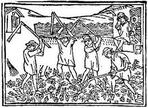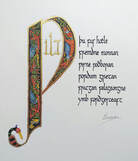|
Dear American friends,
In the eighteenth century your Founding Fathers drew on the words of a writer, Thomas Paine, and enshrined many of his principles in your Constitution. Wouldn’t it be wonderful if the American government in the twenty-first century could again draw upon a writer for inspiration? Don’t snort! Don’t get me wrong, I’m not referring to myself (although it could do worse, but, of course, you want better and I know of someone much worthier and far more scholarly and she lives and works, dear friends, in your midst in the United States. I refer to the exceptional American-Iranian Ms Fatemeh Keshavarz, who variously describes herself as a Muslim, poet, feminist, and literary scholar (though not necessarily in that order). She is also very modest and I would add to her list, enlightened humanist. The lady is scholarly, teaching Persian/comparative literature in St Louis University. Although much of her work must deal with the past, this lady has an eye for the present and the future. With singular originality, she has identified a modern narrative that she calls New Orientalist. Please bear with my slight digression: I’d like to take you back again to the beginning of the nineteenth century when the first Orientalist wave occurred in European literature. We’re talking about exceptional brains like those of the romantic poets, S.T. Coleridge or George, Lord Byron. Please take a moment to read this verse of Coleridge’s aloud. Some say it is the most lyrical expression of English poetry—the beginning of Xanadu: In Xanadu did Kubla Khan A stately pleasure-dome decree: Where Alph, the sacred river, ran Through caverns measureless to man Down to a sunless sea. So twice five miles of fertile ground With walls and towers were girdled round; And there were gardens bright with sinuous rills, Where blossomed many an incense-bearing tree; And here were forests ancient as the hills, Enfolding sunny spots of greenery. Nobody can doubt the laudanum-inspired genius behind those words, but dear friends, we can question Coleridge’s geopolitical knowledge. Fair enough, he’d never been anywhere near China. As for the well-travelled Lord Byron, his oriental knowledge, too, was second-hand. That is why the New Orientalists are so insidious. Ms Keshavarz does not doubt their intellects: she cites several examples of what she calls exilic voices. Who among you had never read Xanadu? I’d be honestly surprised if even one of you raised her hand. Similarly, surely, we have all read The Kite Runner, by Khaled Husseini, exiled from his native Afghanistan. Ms Keshavarz also cites among others, The Bookseller of Kabul by Åsne Seierstad and most damaging of all, the recent bestseller, Reading Lolita in Teheran, A Memoir in Books, by Aznar Nafisi. Generously, Ms Keshavarz recognises the talents of these writers, but critiques, you’ve guessed, their geopolitical integrity. As she writes about Reading Lolita etc. “The book has focused attention on gender issues in contemporary Iran and moved many readers with its personalised critique of totalitarianism.” But before reaching the important crux of Ms Keshavarz’s argument, I’d like to digress and explain why a writer of Anglo-Saxon historical novels would wish to blog about this issue. Please bear with me a moment, not all is as it seems. If any of you has explored my website (I fervently hope you all will), you’ll know that after writing about twenty ‘Anglo-Saxon’ novels, I decided to measure my skills against another genre and opted for a series of police mystery novels beginning with The Quasimodo Killings and setting them in Metropolitan London, UK—a city I know reasonably well. Now this is really hot off the press! Two days ago, I decided to write Book 4 of this Vance & Shepherd series and to link the river Thames with the Tigris. Here’s the rub: my precarious health and wallet together make it impossible for me to visit Iran. I have long admired Persian history and have a great respect for Iranian culture and as someone who is very diffident about television news (yes, even the BBC!) I decided I needed to stop writing the new book. I’m prolific and already the first two chapters were done. Now, I refuse to fall into the trap. I will not be guided by the blind. When I lack first-hand experience, I turn to research. Hence, I chose Ms Keshavarz’s brilliant Jasmine and Stars: Reading More than “Lolita” in Teheran. The title alone was enough to convince me, here was what I needed—how right I was! I heartily recommend it to you all for the below reasons, but meanwhile wish to underline that sadly, I have never met Ms Keshavarz and we certainly do not share the same publisher, nor do I have any financial interest in recommending her book. As I said, here come the reasons, and again, I quote from Ms Keshavarz: The emerging Orientalist narrative has many similarities to and a few differences from this earlier incarnation. It equally simplifies its subject. For example, it explains almost all undesirable middle eastern incidents in terms of Muslim men’s submission to God and Muslim women’s submission to men. This kind of view simplifies and replicates earlier narratives with their strong undercurrent of superiority and of impatience with the locals. We cannot and must not, implies our lady scholar, erase through unnuanced narration, the complexity and richness in the local culture. In my new book, I wish to emulate Ms Keshavarz and avoid stereotypes. Damn, it’ll only be a mystery novel, not an essay about modern-day Iran, but like the scholarly lady, I’d like to listen for the seemingly insignificant voices that carry the wisdom, tenderness, beauty, and humour in a culture, to open the door and let them into the safety of our recognition. I’ll end this blog with a huge thank you to Ms Keshavarz for teaching this old dog new wisdom from afar and with the promise that I’ll finish my Book 4 of the Vance & Shepherd series. Watch this space! and whilst you’re waiting, treat yourself to Ms Keshavarz’s informative Jasmine and Stars: Reading More than “Lolita” in Teheran. Always remember that democracy is a fragile orchid, forever in need of tender loving care. Democracy cannot be imposed from the outside but must grow from within. Thank you, American friends and others for reading thus far. Thank you for reading my blog post! If you enjoyed it, make sure to sign up for my email list to get even more insights, historical facts, and exclusive content delivered straight to your inbox. As a thank-you for subscribing, I'm offering a free eBook version of one of my historical novels, so you can continue your journey through history. Enter your email address below and you'll receive your free gift in minutes! I won't spam you or share your information with anyone else. You can expect to receive a newsletter from me once a month, with updates on new releases, book promotions, and special offers. Join my community of history and fiction lovers today! Yours, John Broughton  Get a free eBook!Join my newsletter & receive a free digital copy of Heaven in a Wildflower, book 1 of my St. Cuthbert Trilogy, as well as monthly news, insights, historical facts, & exclusive content delivered straight to your inbox! Thank you!You have successfully joined my mailing list!
0 Comments
Leave a Reply. |
To buy your copy of Rhodri's Furies click the link below:
https://www.amazon.co.uk/Rhodris-Furies-Ninth-century-Resistance-incursions-ebook/dp/B0BPX9C2D3/ |




